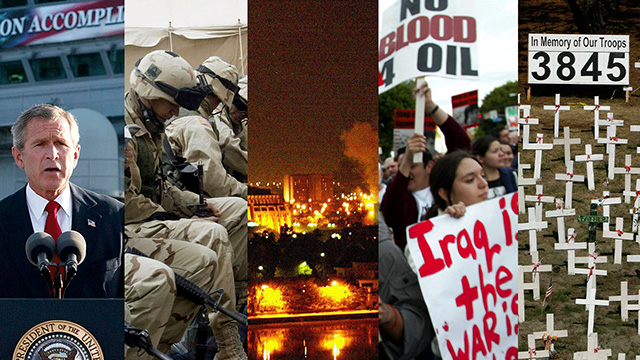
Twenty years ago, the United States invaded Iraq, with then-president George W Bush describing it as a necessary act “to free its people and to defend the world from grave danger.” A few weeks later, Bush boasted that the war was a success because US troops had ousted Iraqi dictator Saddam Hussein and routed his army, reminds Daniel Williams, a former foreign correspondent for The Washington Post, Los Angeles Times and Miami Herald.
Bush landed on an American aircraft carrier and wore a Tom Cruise-style, Top Gun Air US Force outfit – thus orchestrating the most grandiose photo op in US history. “The tyrant has fallen, and Iraq is free,” he announced as he spoke beneath a broad banner that proclaimed, “Mission Accomplished.”
It didn’t take long for the “Accomplished” boast to fall apart. Before Bush left office, he mounted a “surge” of troops to battle Islamic and Saddam-remnant insurgents. Chaos continued almost uninterrupted.
Almost none, at least initially, of the attention focused on the important effects on important outsiders, namely Russia and China. Those omissions should count as further blunders.
Take the case of Saudi Arabia, which from the start categorically refused participation. “We do not accept that this war should threaten Iraq’s unity or sovereignty,” a top official said.
Saudi Arabia did permit US warplanes to use Saudi air bases, but relations had changed: Saudi Arabia slowly but surely increased its links with China and Russia, the latter of which is an associate member of OPEC.
“The Saudis have emphasized in recent years that they seek to avoid entanglement in what is referred to in the US as ‘great power competition’,” said Gerald Feierstein, a former US ambassador to Yemen. “Their interests, the Saudis have made clear, have focused on maintaining strong relations with their main security partner, the US; their number one economic partner, China; and their key partner in OPEC+, Russia.”
Then there’s Russia and China. The Iraq War drastically altered their views toward the United States and the changes are now dramatically playing out in the field of international affairs.
Meanwhile, China’s opportunities for economic influence in the Middle East were bolstered by US ineptitude in Iraq. The region became a part of China’s Belt and Road Initiative (BRI) plans, unveiled in 2013. By 2020, China had become a major importer of Middle East oil.
Observers also noted that China, once focused on its own near-abroad and centered on economic issues, has moved to center stage in global diplomacy. Its help in brokering renewed diplomatic relations between Saudi Arabia and Iran is a stunning example — the Saudis were once fast allies of the US.
George W Bush’s war planners had their eyes on organizing a new Middle East. They did not consider that the reading of the Iraq War and its general ineptitude would be viewed as an opening for new foreign political and military activities by two competitors.
“The Iraq War ended an era of Western hubris about the theory and practice of democracy promotion,” wrote Louise Fawcett, an international relations professor at Oxford University. “For both Russia and China, therefore, the Iraq War helped to erode the myth of Western omnipotence and open the Middle East as a competitive space for economic and strategic opportunity.”
The expressed reason for the invasion was the need to stop Iraq from using and/or developing weapons of mass destruction — nuclear, chemical and biological. Despite the insistence of Bush and his officials that such programs existed, none was found.
The US administration and its intelligence agents also insisted Saddam Hussein had a hand in the 2001 al-Qaeda attacks on New York and Washington. But history shows he didn’t. The accusations were “full of garbage,” said Robert E Kelly, an associate fellow at the Stockholm International Peace Research Institute (SIPRI). He was part of a team from the International Atomic Energy Agency tasked with investigating the assertion that Iraq had nuclear weapons.
“Politics, compliance and groupthink prevailed,” Kelly wrote in an essay published by SIPRI on March 9. “The result of all this was a war that killed hundreds of thousands of people and fueled years of instability in Iraq and around the region.”
read more in our Telegram-channel https://t.me/The_International_Affairs

 10:56 25.03.2023 •
10:56 25.03.2023 •






















